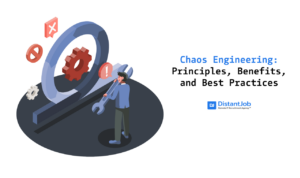If you’re hiring web developers, you have two main options: hire a full-stack developer or a specialized developer.
Full stack developers, also known as jack of all trades, are the first option for businesses who want to optimize costs while having an expert who can handle more than one task. Whether you need help on the front or back end, a full-stack developer can promise you the moon and stars.
However, there are some tasks with an in-depth level of specialization that only dedicated experts can provide.
When it comes to hiring a full stack vs. a specialized developer, the decision boils down to the tasks and roles. Full-stack developers are suitable for roles with broad skills, but specialized developers are the optimal choice for specific tasks.
Let’s explore more in-depth the differences between both roles, as well as the ideal use cases for employing full-stack developers.
Jump To:
Full Stack Developers Vs Specialized Developers
Full-stack developers are well-versed in both front-end and back-end web development (server-side). As a result, they have a thorough understanding of software development.
In contrast, specialized developers are highly trained in one or two specific technologies. They can solve challenges at a faster pace and can build robust systems at scale, provided these are done in the specialized tech stack they are familiar with.
Key Differences Between Full Stack vs. Specialized Developers
| Full Stack Developer | Specialized Developer |
| Must understand both front-end and back-end technologies. | Should have a thorough understanding of either front-end or back-end issues. |
| Well-versed in a wide range of technologies and abilities. | Highly trained & experienced in one particular sector. |
| Must have a diverse skill set that includes project planning, software testing, and more. | Should have deep expertise in one area rather than other skill sets. |
| Can take up an entire project on their own. | Take care of one specific system in a project. |
| Hiring them is comparatively less expensive. | Specialist developers usually charge higher than full-stack developers. |
Full Stack Engineer: Skills, Pros And Cons
Full-stack developers are in high demand right now and will continue to be so in the future. According to the Bureau of Labor Statistics, jobs for full-stack developers are expected to expand from 135,000 in 2016 to 853,000 in 2024.
Full-stack developers must have the following skills:
- HTML/CSS basic design skills
- JavaScript
- Web architecture
- Git and GitHub
- HTTP and REST
- Back-end languages
- PHP
- Ruby
- Python
- Java
- Database Storage
- Basic Design Skills
- NPM
- Design software skills
Interesting Read: Hiring Software Developers: Where To Find Them
Pros of Hiring Full-stack Developers
1. Identifying Problems
Full-stack developers are well-versed in all phases of software development to see problems early in the project’s life cycle.
2. They Can Pick Up New Information Quickly
The ability to pick up new ideas and technologies is a great full-stack developer advantage. They’ve become experienced developers because of their well-versed knowledge of fundamentals.
3. Low-cost
Hiring a full-stack developer can help cut down costs by combining the jobs of both front-end and back-end developers. There is no need to employ multiple staff if you have a full-stack developer on your team who knows how to do everything.
A full-stack developer might be more cost-effective for your business than a specialized developer when you’re uncertain about which role to hire. You’ll pay less for hiring a full-stack vs. front-end developer or full-stack vs. backend developer.
4. Shorten the Time Needed for Development
Because full-stack engineers work on both the client and the server sides, they can do various tasks quickly and independently. This reduces the amount of time you have to spend going back and forth between team members and means they have greater uptime developing.
5. Fewer Meetings and Conversations
There are numerous meetings to have when you have various devs on your team. A full-stack developer frees your team from relying on other members, reducing the need for meetings.
Having said that, there are still a few limitations to employing full-stack developers.
Cons of Hiring Full-Stack Developers
1. Lacking Up-To-Date Technological Trends
There is no free time for full-stack developers since they deal with various technologies.
Full-stack developers may not be helpful if your product relies on cutting-edge technology and must be continually updated.
2. Project Tracking Is Difficult
When your team consists of a full-stack developer, there is no work distribution. Full-stack developers approach the project as a whole rather than as individual jobs. It isn’t easy to keep tabs on their progress after they’ve started working on your project.
3. Potential Lack of Exceptional Service
Full-stack developers might lack specialist abilities in a given topic since their knowledge base is so diverse. As a result, full-stack developers may not assist your project if it requires in-depth knowledge of a specific topic.
So, in terms of project development, they can deliver many services, but they might be average and not excel in a particular area you want or that the project needs.
4. Job Depreciation
Fullstack developers are in great demand, and as a result, they have a steady stream of lucrative work. Because of this, full-stack developers have a high job depreciation rate.
5. Difficult To Replace
If you have a full-stack developer on board and they fail your project midway through, you may find yourself in a difficult position. You cannot afford to lose the full-stack developer since you rely on them to carry a project to its completion.
Specialist Software Engineer: Skills, Pros And Cons
Specialized developers are experienced professionals who have chosen to focus their skill set and expertise on a particular area of software development.
Instead of having a broad knowledge of various development aspects like full stack developers, specialized developers focus on a specific technology, platform, domain or aspect of the development process.
This allows them to be highly proficient and knowledgeable in their chosen field. For example, an Angular developer specializes in the front end of web application development, having a skill set that includes: Angular fundamentals, TypeScript, HTML and CSS, data binding, Angular tools, and more.
Pros of a Specialized Developer
1. Exceptional Performance
Because the Specialist Developers are experts in their fields, you know you’ll get high-quality work. Specialized developers outperform full-stack developers in terms of project development quality.
2. They Are Keeping Up With The Newest Technological Developments
A specialized developer is well-versed in a specific field, so they stay ahead of the newest developments in that field. Hiring expert developers for your project ensures that the overall quality will be improved.
3. Responsibilities Are Easily Delegated
It’s easy to delegate responsibility and duties to your team’s specialist developers because of the narrow focus of their work. They’ll have no problem dividing and allocating tasks.
4. It’s Easy To Hire A New One
You’ll have an easier time finding project-specific developers than full-stack developers. Because of this, the number of chances for software engineers is increasing.
There is a large population of specialist developers on the market. Therefore, it is possible to find the developers you need for your company.
Cons of a Specialized Developer
1. Expensive
For front-end and back-end development, you’ll need separate teams of developers when dealing with specialist contractors.
On the other hand, full-stack developers require a single developer to complete your project. This means that hiring expert developers will cost you a lot more money.
2. Dependency
When working with specialized developers on a project, you’ll need to rely on them more. Front-end and back-end devs can’t go forward without each other’s input.
3. Teamwork Management
Because the specialized development team is more interdependent, it requires more meetings and talks for the project to run well. You want to make sure that everyone is on the same page so the work goes smoothly.
Who Should You Hire: Full Stack vs. Specialized Software Engineer
Choose a Fullstack Developer IF…
1. You’re working on a simple project
When working on a small project, it’s best to engage full-stack developers since they can work independently on a variety of different technologies and only achieve your project’s objectives.
Full-stack developers have the flexibility to work on many projects simultaneously and still fulfill deadlines.
2. You’re working on a project with a low level of difficulty
Complex projects need the use of specialist developers who have the necessary expertise. Fullstack developers, on the other hand, are better suited to tasks of smaller complexity or when the project is relatively straightforward.
They can also work easily in remote teams where you have already defined SOPs, and the projects are well-defined.
3. You have limited financial resources
If your project development budget is tight, you’re better off investing in full-stack engineers rather than specialized ones.
4. There’s a tight deadline to meet
Multitasking is second nature to full-stack developers, and they possess the skills to complete a project’s development on their own.
Hiring a full-stack developer is preferable if you are pressed for time and need the project completed quickly.
5. You’re starting a new company or running a small business
Startups are limited by resources like time and money. In the beginning, you might not need specialist resources when you are just testing an idea or preparing for an MVP launch.
Choose a Specialized Developer IF…
6. You’re working on a big project
It’s good to hire a specialist development team when your organization is working on a significant project since they’ll break it down into manageable chunks and work toward your objectives step by step.
7. The quality of the project is of paramount importance
Use expert developers if your project is critical and necessitates high levels of quality and accuracy. They will bring precision, professional knowledge, and extensive experience to the table.
8. The project is comprised of a lot of complicated tasks
When working on a complicated project, recruiting specialized experts is better. To operate effectively and meet goals, they must have extensive knowledge and expertise. Full-stack developers might not be the best bet in these cases.
Conclusion
It is impossible to generalize the needs of any project.
You must analyze your project to determine if you need a full-stack or specialist developer. Before assembling your developer team, make a list of the requirements specified by your CTO or technical team required for the project.
At DistantJob, we can help you find the technical talent you need. Our team of global recruiters ensures that all candidates presented match your requirements. Besides the technical aspects, we also focus on culture fit and understanding the type of person you like working with.
From documentation to tax and payroll, we take care of everything. Start your hiring process today!




